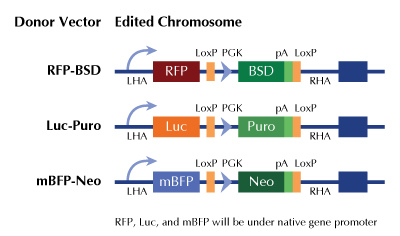Tgfbr2 Mouse Gene Knockout Kit (CRISPR)
CAT#: KN317488RB
Tgfbr2 - mouse gene knockout kit via CRISPR, HDR mediated
Functional Cassette: GFP-puro Luciferase-Puro mBFP-Neo
HDR-mediated knockout kit validation
USD 1,657.00
4 Weeks*
Specifications
| Product Data | |
| Format | 2 gRNA vectors, 1 RFP-BSD donor, 1 scramble control |
| Donor DNA | RFP-BSD |
| Symbol | Tgfbr2 |
| Locus ID | 21813 |
| Components |
KN317488G1, Tgfbr2 gRNA vector 1 in pCas-Guide CRISPR vector KN317488G2, Tgfbr2 gRNA vector 2 in pCas-Guide CRISPR vector KN317488RBD, donor DNA containing left and right homologous arms and RFP-BSD functional cassette. GE100003, scramble sequence in pCas-Guide vector |
| Disclaimer | These products are manufactured and supplied by OriGene under license from ERS. The kit is designed based on the best knowledge of CRISPR technology. The system has been functionally validated for knocking-in the cassette downstream the native promoter. The efficiency of the knock-out varies due to the nature of the biology and the complexity of the experimental process. |
| Reference Data | |
| RefSeq | NM_009371, NM_029575 |
| UniProt ID | Q62312 |
| Synonyms | 1110020H15Rik; AU042018; DNIIR; RIIDN; TbetaR-II; TbetaRII; TBR-II |
| Summary | Transmembrane serine/threonine kinase forming with the TGF-beta type I serine/threonine kinase receptor, TGFBR1, the non-promiscuous receptor for the TGF-beta cytokines TGFB1, TGFB2 and TGFB3. Transduces the TGFB1, TGFB2 and TGFB3 signal from the cell surface to the cytoplasm and is thus regulating a plethora of physiological and pathological processes including cell cycle arrest in epithelial and hematopoietic cells, control of mesenchymal cell proliferation and differentiation, wound healing, extracellular matrix production, immunosuppression and carcinogenesis. The formation of the receptor complex composed of 2 TGFBR1 and 2 TGFBR2 molecules symmetrically bound to the cytokine dimer results in the phosphorylation and the activation of TGFRB1 by the constitutively active TGFBR2. Activated TGFBR1 phosphorylates SMAD2 which dissociates from the receptor and interacts with SMAD4. The SMAD2-SMAD4 complex is subsequently translocated to the nucleus where it modulates the transcription of the TGF-beta-regulated genes. This constitutes the canonical SMAD-dependent TGF-beta signaling cascade. Also involved in non-canonical, SMAD-independent TGF-beta signaling pathways (By similarity).[UniProtKB/Swiss-Prot Function] |
Documents
| Product Manuals |
| FAQs |
| SDS |
Resources
Other Versions
| SKU | Description | Size | Price |
|---|---|---|---|
| KN317488 | Tgfbr2 - mouse gene knockout kit via CRISPR, HDR mediated |
USD 1,657.00 |
|
| KN317488BN | Tgfbr2 - mouse gene knockout kit via CRISPR, HDR mediated |
USD 1,657.00 |
|
| KN317488LP | Tgfbr2 - mouse gene knockout kit via CRISPR, HDR mediated |
USD 1,657.00 |
|
| KN517488 | Tgfbr2 - KN2.0, Mouse gene knockout kit via CRISPR, non-homology mediated. |
USD 1,657.00 |
|
| GA204324 | Tgfbr2 CRISPRa kit - CRISPR gene activation of mouse transforming growth factor, beta receptor II |
USD 1,657.00 |
{0} Product Review(s)
Be the first one to submit a review






























































































































































































































































 Germany
Germany
 Japan
Japan
 United Kingdom
United Kingdom
 China
China
